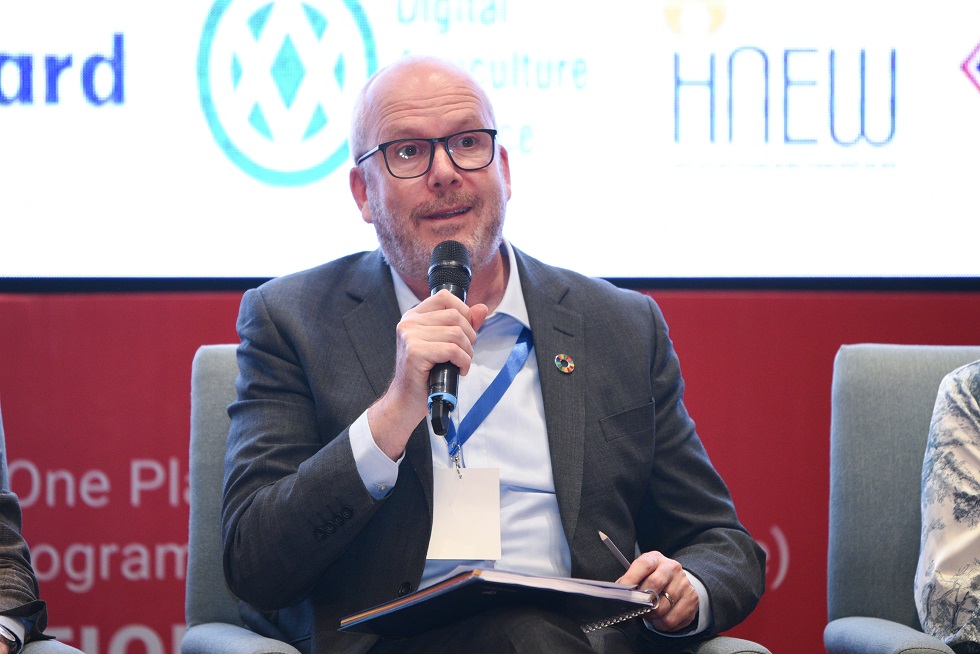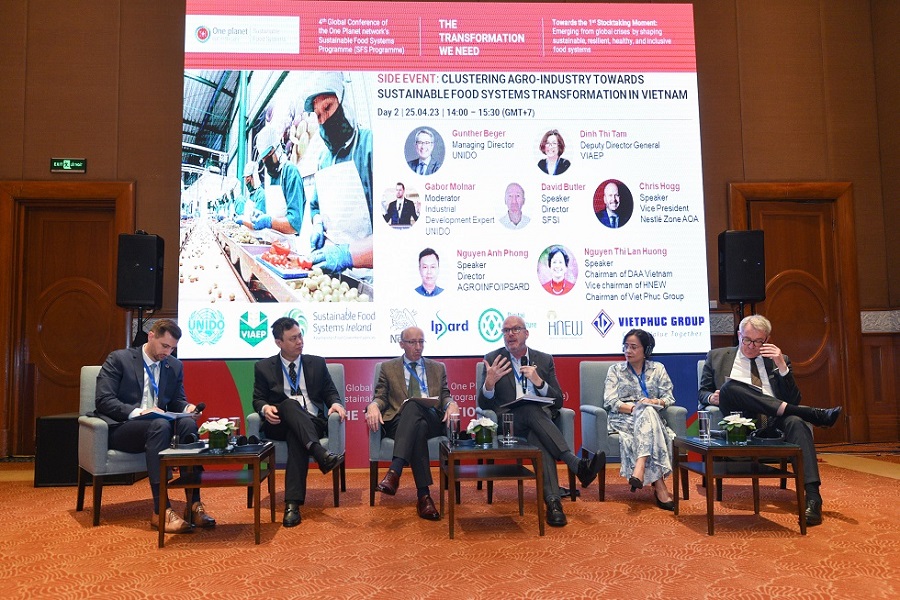Amidst the adverse impact of climate change, biodiversity reduction, the military conflict, and epidemics, the transition to a transparent, responsible and sustainable food system will help Vietnam become a center not only providing food for nearly 100 million Vietnamese people but also contributing to the global food security. Developing agro-economic clusters will spur the above transition, and according to Nestlé, experiences show that the development should take farmers as the core and the biggest challenge of the process is how to build farmers’ trust.
On April 25, the Ministry of Agriculture and Rural Development and the United Nations Industrial Development Organization (UNIDO) held an event titled the Industrial Cluster towards a Sustainable Food System in Vietnam that featured the participation of management bodies in agriculture, experts and businesses to discuss and find solutions to establish agro-economic clusters to support and enhance the transformation of the Vietnamese food system by sharing and learning from businesses’ experiences.
According to UNIDO, the economic cluster is a geographical concentration of businesses and organizations that are connected together and have mutual opportunities and challenges. Local and global clusters now face the same challenges, including climate change, fast changes of environmental regulations, and socio-economic crises. To develop agro-economic clusters effectively, it is needed to have the participation of many stakeholders from raw material suppliers, agricultural and farming equipment suppliers to farm owners, manufacturing businesses, and exporters to connect domestic buyers to international ones.

At the event, Chris Hogg, Vice President, Head of Sustainability and Communications, Zone Asia, Oceania and Africa, Nestlé, said that the company now supports farmers in many countries, including Vietnam, to transition to a regenerative food system. The transformation aims to protect and contribute to the restoration of the environment and improve farmers’ livelihoods.
Accordingly, in order to transition to a regenerative food system, Nestlé implements many programs to enhance regenerative agriculture for livestock and farming. Nestlé commits that by 2030, 50% of its key ingredients would be sourced from regenerative agriculture methods. For the coffee industry, Nestlé has recently announced the Nescafé Plan 2030 to support transitioning to the regenerative agriculture, at the same time realizing Nestlé’s committements to net-zero emissions by 2050 (Net Zero). Among those, Vietnam is one of seven main markets that Nestlé is conducting the Nescafé Plan 2030.
Nestlé now cooperates with around 600,000 farmers around the world, mainly farmers at small farms. Each region and farm has a unique feature, so regenerative farming practices are designed by Nestlé experts or agricultural experts that Nestlé collaborates to suit the different conditions. However, these practices are easy to be implemented with reasonable costs and can be reproduced in different regions.
In Vietnam, Nestlé is supporting the transition to regenerative agriculture via the Nescafé Plan that has been implemented since 2011. The program which was successfully connected to 21,000 coffee farming households in the Central Highlands has contributed to enhancing Vietnamese coffee quality and improving farmers’ income by 30% to 100%, reducing carbon dioxic emissions on each kilogram coffee harvested.
Chris Hogg said, “To make the transformation truly effective, we need to put farmers and farm workers at the center when designing programs and ensure these programs benefit communities and planet.”
Having experience from implementing regenerative agriculture in many countries, Chris Hogg said that the biggest challenge of the implementation was how to build farmers’ trust, a key to success of the transformation.
The transformation needs to actually benefit farmers, society and the environment. Therefore, Nestlé pilots implementing the program in a small scale to eveluate its effectivenes before replicating this model to create real positive impacts and win farmers’ trust. Simultaneously, Nestlé applies “training the trainer” method to provide training for one farmer leader elected by a group of 50 to 100 farmers. This person will then train the rest of the farmer group.
Besides, there are many other challenges in transforming the agricultural model to attain sustainability. For example, it is not easy to persuade farmers to change their cultivation practices that have existed for many generations. Farmers do not believe that a reduction of chemical fertilizers helps improve soil quality, thereby increasing crop yields. In Vietnam, the Nescafé Plan has successfully proved this when helping farmers cut 40% of the irrigation water and 20% of the chemical fertilizers and pesticides but still ensure the farming productivity.
According to Chris Hogg, the multilateral cooperation enables governments, organizations and residents and the private sector understand the regenerative agriculture. By this way, farmers could be consulted and guided in a correct way and the regenerative agriculture model could be replicated. Nestlé implements the Nescafé Plan under the private public partnership format with the Ministry of Agricluture and Rural Development, the Agricultural Extension Centre of the Central Highlands, and the Western Highlands Agriculture and Forestry Science Institute (WASI).
The Industrial Cluster towards a Sustainable Food System in Vietnam event is one of the sessions within the framework of the 4th Global Conference of the One Planet Network’s Sustainable Food Systems being held in Hanoi from April 24 – 27, 2023, with the topic of transition to a food system healthy, sustainable and responding to climate change and comprehensive given the new crisis.
The conference is co-held by the Ministry of Agriculture and Rural Development in collaboration with the Secretariat of the Sustainable Food System – A United Nations’ One Planet Network. The ministerial-level conference features the participation of more than 350 representatives, with 200 international ones coming from different countries, the United Nations’ agencies and international organizations.









